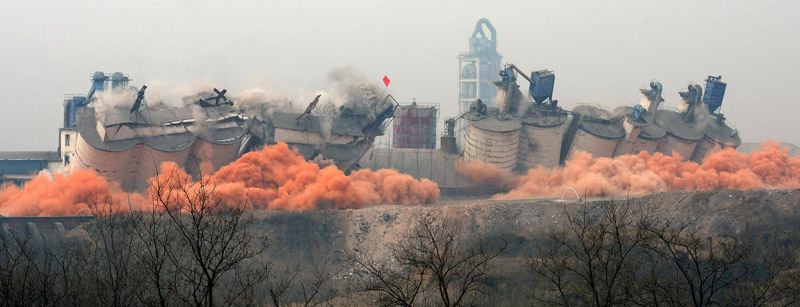Hebei continues with project to cut excess capacity in polluting sectors
Work began in Shijiazhuang, Hebei province, on Monday on the demolition of another 17 cement factories, two months after the first batch of demolitions to improve air quality.
"After the second batch of demolitions is finished in March, we can meet the target of reducing excess capacity three years ahead of schedule, reducing production capacity by 40 percent," said Wang Liang, the mayor of Shijiazhuang. Hebei has been hit by many smoggy days in February, causing serious pollution. On Monday, the air quality index exceeded 200 in the morning.
To control pollution, the provincial government has announced goals for cutting excess capacity in high-polluting industries, including cement production in every city. Shijiazhuang, the provincial capital, must dismantle 15 million metric tons of cement production capacity by 2017.
 |
|
A cement plant in Pingshan county, Hebei province, is demolished on Monday. The province has vowed to tear down more plants to improve air quality.ZHAO WEI / FOR CHINA DAILY |
The demolition of 18 cement powder-making systems and 377 storage bins at the 17 plants will be completed by the end of March, reducing the production capacity by 9.1 million tons.
The 17 plants produced cement that met national standards, but have been forced to close to improve air quality, with cement production a high-polluting industry.
The two batches of demolitions have targeted 35 plants at major production bases, resulting in direct economic losses of 1.1 billion yuan ($180 million) and affecting 3,780 workers.
"We may suffer slow economic growth in the short term, but this will work in upgrading the economic structure and result in a good living environment for our people, so it is worthwhile," said Sun Ruibin, Party chief of Shijiazhuang.
Wang Jiangtao, marketing manager at Yuancheng Construction Material Co, one of plants being demolished in the city of Luquan, said, "We will follow the government project, and want to control air pollution as well, so we agreed to close the plant.
"But it's still sad to see the plants being demolished," he said, adding that the company invested more than 30 million yuan in a new system in 2011. "We have not made enough money to cover the expenses up to now," Wang said.
Under government compensation plans, the plant may get about 10 million yuan and will receive other support for its future business, including preferential policies and tax relief, Wang added.
|
|
|
|
|
|
|
|